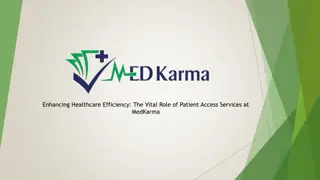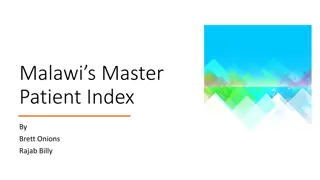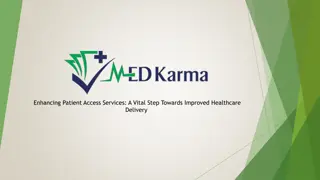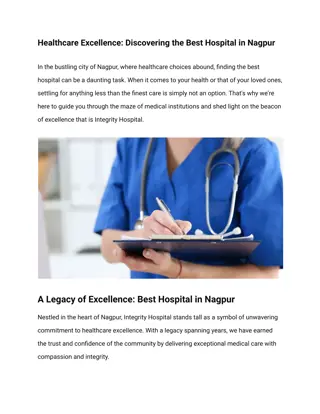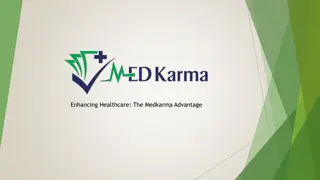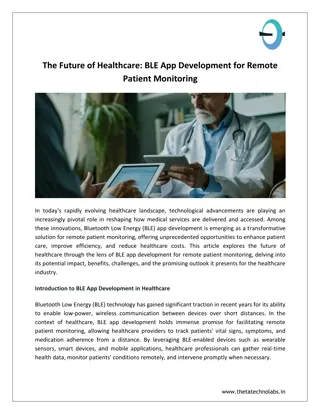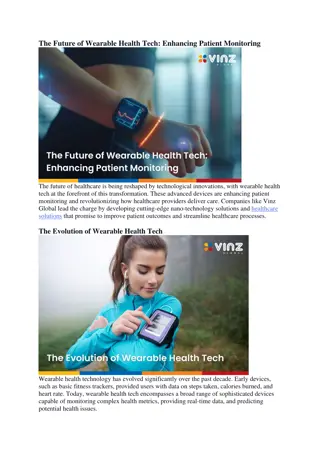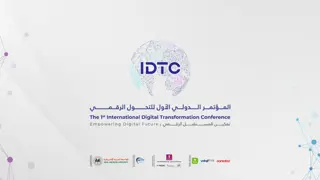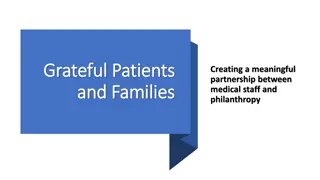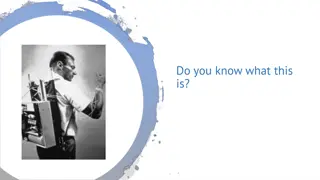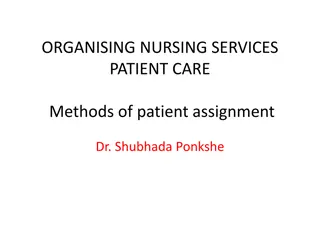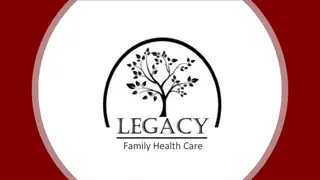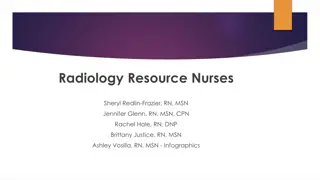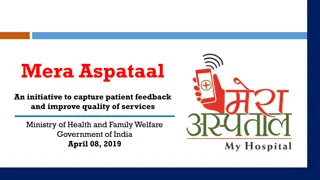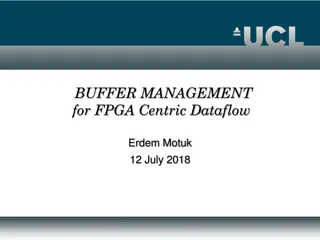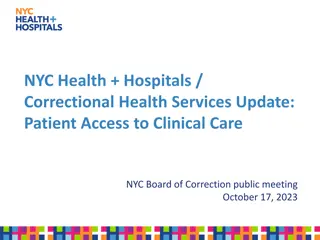Future of Healthcare Transformation and Patient-Centric Innovations
Embracing patient experience enhancement, unity with wearables, and cutting-edge medical advancements will shape the future of healthcare. Organizations like UnityPoint and Walgreens are adapting to support patient needs in a tech-driven healthcare landscape.
Download Presentation

Please find below an Image/Link to download the presentation.
The content on the website is provided AS IS for your information and personal use only. It may not be sold, licensed, or shared on other websites without obtaining consent from the author. Download presentation by click this link. If you encounter any issues during the download, it is possible that the publisher has removed the file from their server.
E N D
Presentation Transcript
Matt Beglinger Medical Software Consultant
Lets Talk About What the Future of Healthcare Will Look Like
Everything should be made as simple as possible, but not simpler - Albert Einstein
Improving the Patient Experience of Care IHI Triple Aim as our Framework Future of Healthcare Improving the Health of Populations Reducing Per Capita Costs of Healthcare
Improving the Patient Experience of Care IHI Triple Aim as our Framework Future of Healthcare Improving the Health of Populations Reducing Per Capita Costs of Healthcare
In the future, UnityPoints main competition will not be from other healthcare organizations but rather from patients and their wearables. In order to remain relevant, UnityPoint will need to support patients use of them by adding value around the information they provide. John Hendricks, CTO UnityPoint Health
http://www.patentlyapple.com/patently-apple/2015/06/walgreens-continues-http://www.patentlyapple.com/patently-apple/2015/06/walgreens-continues- to-work-hard-and-think-ahead-for-their-apple-watch-app.html
Improving the Patient Experience of Care IHI Triple Aim as our Framework Future of Healthcare Improving the Health of Populations Reducing Per Capita Costs of Healthcare
Advances in genomic and molecular medicine hold the potential to radically transform human health by enabling much more precise prediction, prevention, and treatment of disease on an individual level. But realizing this potential requires a total rethinking of how health care is delivered from designing new models of care that incorporate unprecedented technologies and a greater focus on prevention, to changing financial reimbursement to support these models, to empowering patients to play a leading role in their care. Geoffrey Ginsburg, MD, PhD Director, Center for Personalized and Precision Medicine Duke University
Improving the Patient Experience of Care IHI Triple Aim as our Framework Future of Healthcare Improving the Health of Populations Reducing Per Capita Costs of Healthcare
[Presently] the sickest 15% take up 15% of the GDP, if we extrapolate this out over the next two decades, with the growth of baby boomers, at this rate it s 60% of the GDP. I offer 60% of the GDP has very little to do with healthcare at that point. It has to do with a gallon of milk, it has to do with college tuition, it has to do with everything we value and everything we know, presently. Timothy Ihrig, MD Medical Director of Palliative Medicine UnityPoint Fort Dodge
Improving the Patient Experience of Care IHI Triple Aim as our Framework Future of Healthcare Improving the Health of Populations Reducing Per Capita Costs of Healthcare
If were going to improve the patient experience we re going to first need to know what is it that patients want. And ensure it aligns with our solution.
What patients want https://www.advisory.com/~/media/Advisory- com/Research/MPLC/Resources/2015/30502_MPLC_Consumer_Survery_IG_web.pdf
How will this all be enabled by healthcare IT? The Office of the National Coordinator for Health IT (ONC) has a potential solution.
The Nationwide Learning Health System An environment that links the care delivery system with communities and societal supports in closed loops of electronic health information flow, at many different levels, to enable continuous learning and improved health. This kind of system allows individuals to select platforms and apps to share and use their own electronic health information to meet their needs without undue constraints. http://www.healthit.gov/sites/default/files/nationwide-interoperability- roadmap-draft-version-1.0.pdf
Goals of the Nationwide Learning Health System A system for meeting the Triple Aim This learning health system should also result in lower health care costs (by identifying and reducing waste), improved population health, truly empowered consumers and ongoing technological innovation. Enables individuals and providers to send, receive, find, and use a common set of clinical information Utilizes many data sources across the spectrum of care Feeds data to researchers and helps reduce the amount of time it takes from evidence to practice The system is never ending and cyclical Sharing and use of patient-generated health data leads to consumer empowerment, person- centered care, active individual health management, and greater information sharing with the public health community http://www.healthit.gov/sites/default/files/nationwide-interoperability-roadmap-draft-version-1.0.pdf http://www.healthit.gov/sites/default/files/shared_nationwide_interoperability_roadmap.pdf
End of 2017 (3 Year Goal Widespread Interoperability) http://www.healthit.gov/sites/default/files/sha red_nationwide_interoperability_roadmap.pdf
End of 2020 (6 Year Goal The Connected Patient) http://www.healthit.gov/sites/default/files/sha red_nationwide_interoperability_roadmap.pdf
End of 2024 (10 Year Goal The Learning Health System) http://www.healthit.gov/sites/default/files/sha red_nationwide_interoperability_roadmap.pdf
How does this meet the Triple Aim? In a nutshell it is the Triple Aim: Improvements are never ending It goals are to improve the patient experience, improve the health of populations, and to reduce per capita costs
Change Is Happening In a February 2015 article from the Harvard Business Review, they interviewed 150 healthcare executives. More than 70% of participants reported that they felt their organizations were well positioned for future success They also had minimal fear of new competition However, more than half of the executives felt their operational model is in need of change and disruption https://hbr.org/2015/02/the-biggest-u-s-health-care-challenges-are-management-challenges
When things are going well, why disrupt? The Affordable Care Act made cost of healthcare top of mind and crystalized the need for reform . Many providers are leading the charge, moving further and faster to redesign care delivery than the law requires. Many health care leaders understand that there will be little room in the health care landscape of the next decade for laggards. These leaders may feel confident about their strategic direction, but they know their current models won t get them where they need to go. Thus they need to become their own disruptors. https://hbr.org/2015/02/the-biggest-u-s-health-care-challenges-are-management-challenges
Efforts Underway at UnityPoint Health UnityPoint Health as an example is leveraging MyChart, supporting Wearables, and developing a Mobile App Innovations Lab Stock wearables and allow providers to borrow them for their own trial UnityPoint At Home s use of telehealth Allowing patients to check and send in their vitals from the comfort of their own home
Our first job should be to ensure the privacy and safety of patient information As an industry, we will continue to collect more and more patient information and patient information will become ever more accessible, so as a result patients are at an ever increasing risk of becoming vulnerable and exploited. The Learning Health System calls for lots of patient information to be collected and shared, how do we protect patients and their rights? Ultimately, patient trust will need to be earned
Great Example: Mayo Clinic The Mayo Clinic has built from the ground up a new way of protecting patient information through the formation of their Office of Information Security Goal of the office according to Jim Nelms, their CISO: There is a great deal of technology between a patient and a doctor, that we want to ensure does exactly what the physician says it s supposed to do, no more and no less . Their security technology is cutting edge and in some ways they ve had to build their own tools They have hired many individuals from outside of healthcare, individuals from the DoD, financial, and other sectors. Their goal was to hire the best of the best. Their approach is to consider the path from patient to provider and all information that flows. Where are the places that this information can become compromised. Their perspective is this information is a matter of life or death as decisions are made on this information. http://www.mayoclinic.org/jobs/career-profiles/information-security/overview
But Lets Not Forget The Real Challenge Facing Healthcare Not reaching the right patients (elderly and poor) If we had to generalize, the elderly and the poor on average are the sickest and the ones most in need of help However, sadly they are also the ones least likely to benefit from improvements in care that result from technology. For this group, technology is either not in their vocabulary or financially out of their reach. So the big question will be how to engage these patients in the Learning Health System http://www.marketplace.org/topics/economy/health-care/getting-know-sickest-patients http://kff.org/medicare/video/old-and-poor-americas-forgotten/
So is there Hope in HIM? Health Information Technology (HIT) enables Health Information Management (HIM) Ultimately, it s effective use of Health Information Management (HIM) that s shows the most promise of supporting the Triple Aim So, can HIM help healthcare achieve the Triple Aim? Can it help improve the patient experience of care? Can it help to improve health of populations? Can it help to reduce per capita healthcare costs?
Call to Action The [Nationwide Learning Health System] Roadmap identifies critical actions that should be taken by a wide range of stakeholders to help advance nationwide interoperability. I invite you to review the Roadmap, provide your input and choose a critical action that you are willing to commit to, or even take the lead on. It is only through everyone s combined efforts that we will achieve a learning health system that brings real value to electronic health information as a means to better care, wiser spending, and healthier people. Karen B. DeSalvo, MD, MPH, MSc National Coordinator for Health Information Technology http://www.healthit.gov/sites/default/files/nationwide-interoperability-roadmap-draft-version-1.0.pdf



